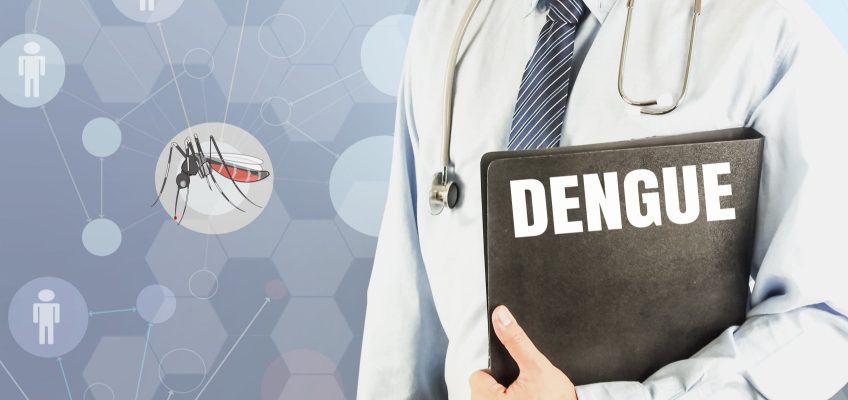Dengue Fever is a viral illness which is common in tropical areas.
Symptoms of Dengue Fever can range in severity with a mild case feeling like a dose of the flu. In extreme cases, Dengue Fever can be fatal.
Some estimates suggest that there are approximately 100 million cases of Dengue Fever each year. There are 4 types of Dengue viruses known to cause illness in humans. These are known as DEN-1, DEN-2, DEN-3 and DEN-4. Infection with one type of dengue leads to lifelong immunity – but only to that type. It is therefore possible to contract Dengue Fever more than once. A person who has previously contracted the virus is at higher risk of suffering more severe symptoms if they get infected again.
How do you get it?
Dengue Fever is caused by a virus carried by certain types of mosquitoes. Typically, it is spread by the Aedes aegypt and Aedes albopictus species. Both species are more active during daylight hours.
To catch this illness, you must be bitten by an infected mosquito. Usually a mosquito becomes infected if they have previously bitten a person who is suffering from Dengue Fever. After an incubation period of 8-12 days, an infected mosquito can transmit Dengue Fever. The mosquito will be infectious for its lifetime.
Dengue Fever cannot be transmitted from human to human – to contract it, you must be bitten by an infected mosquito.
Where in the world is it?
Dengue Fever is common in tropical and sub-tropical areas. Most notably, it is found in Asia, the Pacific, Africa, Central and Southern America.
It is endemic in approximately 100 countries around the world. This means the virus is always present and easily spread to the human population.
Whilst it is not endemic in Australia, there have been cases in north Queensland. This is typically in circumstances where a person has become infected overseas and then, following their return to Australia, has been bitten by a mosquito. In turn, that mosquito has bitten another person and spread the virus.
What are the symptoms?
Typically it takes 3-14 days for an infected person to feel unwell. The most common symptoms include:
- High temperature
- Severe headache (especially behind the eyes)
- Joint and muscle pain (often ankles, knees and elbows)
- Loss of appetite
- Nausea, vomiting and/or diarrhoea
- Red skin rash (on arms and legs)
- Flushed skin (on face and neck)
- Itchy skin
- Malaise (generally feeling unwell)
- Extreme fatigue
- Abdominal pain
In most cases, symptoms subside in 1-2 weeks. In severe cases though, dengue haemorrhagic fever can occur which is a potentially lethal complication. Usually this only occurs in people who have previously suffered Dengue Fever but it is also known to occur in children. This complication can cause the following additional symptoms:
- Bruising following minor bumps
- Nose bleeds and bleeding gums
- Breathing difficulties
- Persistent vomiting / diarrhoea (often with blood present)
- Confusion
- Restlessness / drowsiness
- Stomach pain
- Cold, clammy, blotchy and/or pale skin
- Collapse or signs of shock
Dengue Fever can be fatal so it is important to seek medical attention if you have any of these symptoms and have been in areas where the illness is prevalent.
How is it diagnosed and what is the treatment?
Diagnosis usually involves clinical assessment where a doctor will examine you, discuss your symptoms and medical history. The doctor may also order a blood test to confirm the diagnosis. This blood test will detect the presence of the virus or antibodies in your blood.
Unfortunately there is no specific treatment. Symptoms can be alleviated with rest, increasing fluid intake and taking pain relief medication such as paracetamol. Medical advice is to avoid painkillers such as asprin, ibruprofen and other NSAIDs as they increase the chance of bleeding.
In cases of dengue haemorrhagic fever, it is most likely that treatment will necessitate hospitalisation.
How can you minimise the risk of contracting it?
There is no vaccination available to guard against Dengue Fever.
The best form of defence is prevention. Dengue-carrying mosquitoes tend to bite during the day – especially during the morning and early evening. Despite this, you can still be bitten at night.
Here are our top tips to help minimise the potential of infection if travelling to high risk areas:
- Cover as much exposed skin as possible at all times – day and night. Preferably wear socks with closed in shoes and wear light coloured long sleeve shirts and long pants.
- Stay and sleep in accommodation which has fly screens on the windows or air conditioning.
- Use mosquito nets if you cannot secure your room against mosquitoes or are sleeping outside.
- If safe to do so, use mosquito coils and/or plug in repellent devices.
- Use insect repellent that contains DEET or picaridin.
- Apply insect repellent in the morning and make sure you re-apply it frequently.
- If using sunscreen, apply repellent after you apply your sunscreen.
- Stay indoors when mosquitoes are particularly active.
- Dengue mosquitoes breed in containers and junk so don’t allow water to pond or collect around your accommodation. Mosquitoes breed in still water (eg pot plant bases, coconut shells, tyres, containers such as vases, tubs and buckets).
Many travellers will be exposed to dengue-carrying mosquitoes will travelling. Fortunately there are measures you can take to minimise the risk of infection. If you do suffer the misfortune of contracting Dengue Fever – or think you may have – seek medical attention as soon as possible. Early detection will increase the chance of a quick recovery.
Got questions about Dengue Fever and travel insurance? Why not call us on 1300 819 888 or send an email to info@goinsurance.com.au


